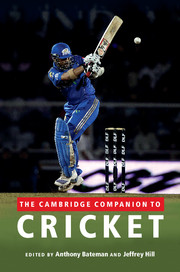Book contents
- Frontmatter
- Introduction
- 1 Cricket pastoral and Englishness
- 2 Cricket in the eighteenth century
- 3 Corruption in cricket
- 4 Broadcasting and cricket in England
- 5 Bodyline, Jardine and masculinity
- 6 Don Bradman: just a boy from Bowral
- 7 The Packer cricket war
- 8 New Zealand cricket and the colonial relationship
- 9 C. L. R. James and cricket
- 10 Reading Brian Lara and the traditions of Caribbean cricket poetry
- 11 The detachment of West Indies cricket from the nationalist scaffold
- 12 The Indian Premier League and world cricket
- 13 Hero, celebrity and icon: Sachin Tendulkar and Indian public culture
- 14 Conflicting loyalties: nationalism and religion in India–Pakistan cricket relations
- 15 Cricket and representations of beauty: Newlands Cricket Ground and the roots of apartheid in South African cricket
- 16 Writing the modern game
- 17 Cricket and international politics
- Further reading
- Index
3 - Corruption in cricket
Published online by Cambridge University Press: 28 September 2012
- Frontmatter
- Introduction
- 1 Cricket pastoral and Englishness
- 2 Cricket in the eighteenth century
- 3 Corruption in cricket
- 4 Broadcasting and cricket in England
- 5 Bodyline, Jardine and masculinity
- 6 Don Bradman: just a boy from Bowral
- 7 The Packer cricket war
- 8 New Zealand cricket and the colonial relationship
- 9 C. L. R. James and cricket
- 10 Reading Brian Lara and the traditions of Caribbean cricket poetry
- 11 The detachment of West Indies cricket from the nationalist scaffold
- 12 The Indian Premier League and world cricket
- 13 Hero, celebrity and icon: Sachin Tendulkar and Indian public culture
- 14 Conflicting loyalties: nationalism and religion in India–Pakistan cricket relations
- 15 Cricket and representations of beauty: Newlands Cricket Ground and the roots of apartheid in South African cricket
- 16 Writing the modern game
- 17 Cricket and international politics
- Further reading
- Index
Summary
For 100 years or more, since the mid-Victorians elevated it to something approaching a holy devotion, the game of cricket stood principally for gentlemanly, and preferably heroic, conduct. So pure was cricket's image that it sometimes resembled a branch of Christianity. Any man or boy who behaved in a disapproved fashion on the field was branded a ‘bounder’. Englishmen took the game with them as a symbol of fair play wherever they advanced the causes of the British Empire.
In stark contrast, in recent decades cricket at the highest level has been dragged into the realms of brash show business, financial profit almost the sole driving force among those who aspired to the responsibility of preserving and steering the game. Cricketers at this level usually seek to justify excesses by pointing to the fact that this is their means of livelihood in a competitive world where the millions – even billions – of pounds, dollars and rupees blind almost everybody to the ethical values of old. By the twenty-first century, so remote a vision has the earlier benevolent concept of sport become that even in minor club matches instances of cheating and abuse, physical as well as verbal, are not rare.
Corruption in cricket embraces a multitude of sins, including biased umpiring, fraudulent promotions, deliberate preparation of pitches to suit home teams, thefts from dressing-rooms and of memorabilia, or – a rare occurrence this, but witnessed at international level – deliberate scuffing of the pitch by a fieldsman.
- Type
- Chapter
- Information
- The Cambridge Companion to Cricket , pp. 40 - 54Publisher: Cambridge University PressPrint publication year: 2011
- 1
- Cited by



